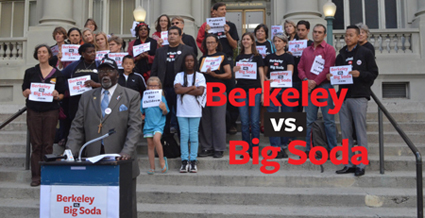Win or lose, San Francisco and Berkeley soda tax measures are public health triumphs
by: Fernando Quintero
posted on Friday, July 11, 2014
For advocates of public health policy, the sands of time could fill the Sahara Desert.
At least it seems that way as months, years, decades go by before structural and institutional changes are made to improve the health and save the lives of people throughout the nation.
These drawn-out battles have surely taxed advocates’ patience and faith in the system. Typically, they’ve been David vs. Goliath fights with advocates being exponentially outnumbered in funds, political clout and other essential resources. They’ve involved countless numbers of defeats, both large and small. And at times they’ve been up against public opinion.
In 2012, I wrote about how change takes time shortly after Johnson & Johnson announced plans to remove a host of harmful chemicals from its products by 2015, becoming the first major company to make such a commitment. It was a change environmental health advocates had sought for nearly a decade — a battle we sometimes highlight as a case study in our media advocacy trainings.
I was reminded about this important lesson when I attended a rally last week that was held by supporters of Berkeley’s sugary drink tax initiative, just minutes before it was unanimously approved by the city council for the November ballot. The measure proposes a 1-cent-per-ounce charge to distributors of soda and other sugary drinks and is similar to a bill across the bay in San Francisco. Following the defeat of two soda tax measures in nearby Richmond and in the southern California community of El Monte, where it was voted down after a $2.7 million campaign by the soda industry, supporters of the Berkeley and San Francisco measures face formidable odds.

At the rally, with its small but enthusiastic band of supporters on the steps of City Hall donning black T-shirts that read “Berkeley vs Big Soda,” I heard both timid and boisterous voices giving heartfelt personal testimonies and summoning support for the tax proposal. I was hopeful the proposals would pass, but cautiously optimistic.
But then I remembered the Johnson & Johnson announcement of two years ago, and also the recent news that the board of the Golden Gate Bridge District voted unanimously to approve a $76 million cable net suicide barrier, a topic I’ve blogged about numerous times. For at least two decades, advocates for the barrier fought to help put an end to the more than a thousand suicides that have occurred at the bridge since it was built. Over the years, they employed a number of strategies including media advocacy to reframe the conversation and address the myths and stigma of suicide. They proved that fostering increased dialogue about suicide and mental illness would eventually lead to increased public support, and eventually, the board’s vote on June 27 to approve the funds.
I think that if a soda tax measure were to pass anywhere, it would be Berkeley and San Francisco. These victories would surely lead to similar measures in other cities throughout the country as more communities and their leaders raise their voices in support of policies that make industry and government more accountable for their health. Eventually, one public policy at a time, we will stem the tide of diabetes and other nutrition-related diseases. It just takes time.



